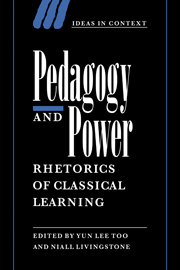Book contents
- Frontmatter
- Contents
- Notes on contributors
- Acknowledgements
- Introduction
- 1 Classics: from discipline in crisis to (multi-)cultural capital
- 2 Schoolboys and gentlemen: classical pedagogy and authority in the English public school
- 3 ‘Die Zung’ ist dieses Schwert': classical tongues and gendered curricula in German schooling to 1908
- 4 ‘What does that argue for us?’: the politics of teaching and political education in late eighteenth-century dialogues
- 5 Women and classical education in the early modern period
- 6 Pilgrimage to Parnassus: local intellectual traditions, humanist education and the cultural geography of sixteenth-century England
- 7 ‘Not so much praise as precept’: Erasmus, panegyric, and the Renaissance art of teaching princes
- 8 Teachers, pupils and imperial power in eleventh-century Byzantium
- 9 Reading power in Roman Greece: the paideia of Dio Chrysostom
- 10 Children, animals, slaves and grammar
- 11 A good man skilled in politics: Quintilian's political theory
- 12 The voice of Isocrates and the dissemination of cultural power
- 13 Xenophon's Cyropaedia: disfiguring the pedagogical state
- Select bibliography
- Index
- IDEAS IN CONTEXT
6 - Pilgrimage to Parnassus: local intellectual traditions, humanist education and the cultural geography of sixteenth-century England
Published online by Cambridge University Press: 30 September 2009
- Frontmatter
- Contents
- Notes on contributors
- Acknowledgements
- Introduction
- 1 Classics: from discipline in crisis to (multi-)cultural capital
- 2 Schoolboys and gentlemen: classical pedagogy and authority in the English public school
- 3 ‘Die Zung’ ist dieses Schwert': classical tongues and gendered curricula in German schooling to 1908
- 4 ‘What does that argue for us?’: the politics of teaching and political education in late eighteenth-century dialogues
- 5 Women and classical education in the early modern period
- 6 Pilgrimage to Parnassus: local intellectual traditions, humanist education and the cultural geography of sixteenth-century England
- 7 ‘Not so much praise as precept’: Erasmus, panegyric, and the Renaissance art of teaching princes
- 8 Teachers, pupils and imperial power in eleventh-century Byzantium
- 9 Reading power in Roman Greece: the paideia of Dio Chrysostom
- 10 Children, animals, slaves and grammar
- 11 A good man skilled in politics: Quintilian's political theory
- 12 The voice of Isocrates and the dissemination of cultural power
- 13 Xenophon's Cyropaedia: disfiguring the pedagogical state
- Select bibliography
- Index
- IDEAS IN CONTEXT
Summary
INTRODUCTION
The Renaissance – so scholars have said for centuries – witnessed the rise of a new scholarship and a new education. Professional humanists and young aristocrats alike bathed themselves, for five to ten years, in ancient prose and verse, before they entered on active careers in State, Church or School. Reading – informed reading of classical texts – became the preferred preparation for leadership. So much is well known.
So much is well known, but we have not begun to appreciate how local, how personalised, and how applied the traditions and the uses of humanistic literacies were in early modern Europe. From the new political history of the Victorian scholar, James Anthony Froude, to the new social history of Lawrence Stone in the 1960s, the notion that sixteenth-century England experienced an educational revolution has been given a special place in accounts of political and social change in the post-Reformation period. Insofar as textual and cultural studies have engaged with these histories, they have most usually done so via the literary analysis of printed and documentary sources in relation to ‘political thought’ and ‘political culture’, now established fields in early modern studies. Whether explicitly stated or not, one of the premisses of such work is that the educational revolution helped produce at the cultural level the integrated national consciousness that the state was seeking to impose at the political and administrative level.
- Type
- Chapter
- Information
- Pedagogy and PowerRhetorics of Classical Learning, pp. 110 - 147Publisher: Cambridge University PressPrint publication year: 1998
- 4
- Cited by

